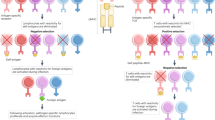Abstract
THE suppressive effects of anti-thymocyte serum (ATS) on cell-mediated immune responses1–4 have been attributed to the selective depletion of recirculating T lymphocytes5. In this view, lymphoid tissues such as thymus which do not contain significant numbers of itinerant, blood-borne lymphocytes would be spared from the debilitating effects of ATS. The observation that the rate of recovery from the effects of ATS is substantially accelerated in the presence of an intact thymus6,7 is consistent with this idea. That the thymus is spared is also supported by studies of the distribution of labelled ATS immunoglobulin (IgG), which indicate that antibody penetrates the thymus very poorly8. These considerations do not, however, directly bear on questions concerning possible alteration in immunological activity of thymus cells after the peripheral administration of ATS. The following experiments demonstrate that graft-vs-host (GVH) activity produced by thymus cells is substantially increased for several weeks after the peripheral administration of a single dose of ATS. As this effect was not produced by normal rabbit serum and was removed by absorption of ATS with thymocytes, it seems to represent a specific immunological consequence of administration of ATS.
This is a preview of subscription content, access via your institution
Access options
Subscribe to this journal
Receive 51 print issues and online access
$199.00 per year
only $3.90 per issue
Buy this article
- Purchase on Springer Link
- Instant access to full article PDF
Prices may be subject to local taxes which are calculated during checkout
Similar content being viewed by others
References
Waksman, B. H., Arbouys, S., and Arnason, B. G., J. Exp. Med., 114, 997 (1961).
Medawar, P. B., in Human Transplantation (edit. by Rappaport, F., and Dausset, J.), 50 (Grune and Stratton, NY).
Levey, R. H., and Medawar, P. B., Proc. US Nat. Acad. Sci., 56, 1130 (1966).
Lance, E. M., and Batchelor, J. R., Transplantation, 6, 490 (1968).
Lance, E. M., Clin. Exp. Immunol., 6, 789 (1970).
Monaco, A. P., Wood, M. C., and Russell, P. S., Science, 149, 432 (1965).
Jeejeebhoy, H. F., Immunology, 9, 417 (1965).
Lance, E. M., J. Exp. Med., 130, 49 (1969).
Cantor, H., Mandel, M., and Asofsky, R., J. Immunol., 104, 409 (1970).
Simenson, M., Prog. Allergy, 6, 349 (1962).
Mandel, M. A., and Asofsky, R., J. Immunol., 100, 1319 (1968).
Cantor, H., and Asofsky, R., J. Exp. Med., 131, 235 (1970).
Cantor, H., and Asofsky, R., J. Exp. Med., 135, 764 (1972).
Cantor, H., Cell. Immunol., 3, 461 (1972).
Greaves, M. F., Roitt, I. M., Zamir, R., and Carnaghan, R. B. A., Lancet, ii, 1317 (1967).
Author information
Authors and Affiliations
Rights and permissions
About this article
Cite this article
CANTOR, H., ASOFSKY, R. Paradoxical Effect of Anti-thymocyte Serum on the Thymus. Nature 243, 39–41 (1973). https://doi.org/10.1038/243039a0
Received:
Issue Date:
DOI: https://doi.org/10.1038/243039a0
This article is cited by
Comments
By submitting a comment you agree to abide by our Terms and Community Guidelines. If you find something abusive or that does not comply with our terms or guidelines please flag it as inappropriate.


